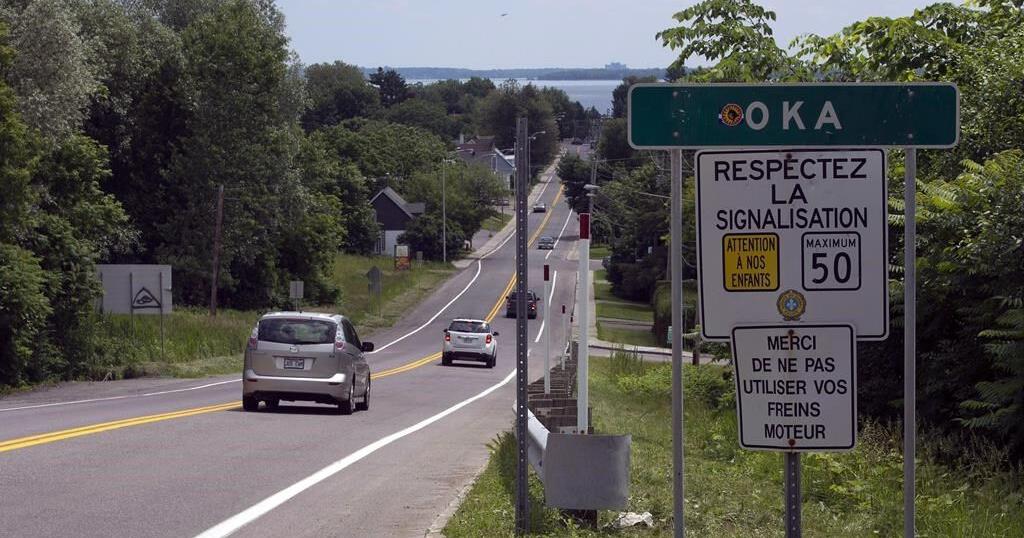MONTREAL – The Quebec government says it has an “action plan” to fight illegal dumping of contaminated soil in a Mohawk community west of Montreal, but residents of Kanesatake and the neighbouring town of Oka say they’ve yet to see the signs of a permanent fix.
Government officials are back in the area this week, alongside provincial police, to collect soil samples from trucks headed to Kanesatake. The move follows an operation last week to inspect sites and collect samples along the shores of the Lake of Two Mountains, where trucks have been dumping potentially contaminated soil from construction sites around Montreal.
Frédéric Fournier, a spokesperson for the Environment Department, says more inspections could be carried out in the future, and that “no recourse has been ruled out” of the government’s effort to reduce illegal dumping in Kanesatake.
A Mohawk community member using the pseudonym Pink, who requested anonymity because they feared reprisals for speaking out, says the government is just “going through the motions” and doubts that anything will change. “I’m very cynical when it comes to anything that’s performative, because I don’t trust them,” Pink said in an interview.
Illegal dumping has plagued Kanesatake for years, and some residents say it’s just one symptom of a culture of lawlessness that pervades the community. They want the federal and provincial governments to help restore a sense of safety to Kanesatake, which they say is in the grip of organized crime.
“We’re literally being taken hostage by these people who are just ruining the community,” said Pink. “If this was another community anywhere in Canada, this wouldn’t be allowed.”
Kanesatake’s local police force was disbanded in 2004, when internal disputes escalated into violence. Quebec provincial police have patrolled the area since 2005 but rarely enter the community, which was the site of the 1990 Oka crisis, a 78-day standoff over land rights between Mohawk protesters and the Canadian Armed Forces.
A group of Oka residents say they’re getting ready to take matters into their own hands if the illegal dumping continues. On Sunday, Oka/Kanesatake ReconciliAction will host a civil disobedience training session to teach residents how to set up roadblocks to prevent unauthorized trucks from entering the Mohawk territory.
Their aim is to pressure Quebec Public Security Minister François Bonnardel to come up with a permanent plan to stop truckloads of waste being ferried to unauthorized dumping grounds in the community.
The group has recruited a grassroots campaign organizer to teach citizens how to conduct road checks and to de-escalate volatile situations. Organizer Julie Tremblay-Cloutier said about 55 people had registered as of Thursday, mostly from Oka, with some from Kanesatake.
There’s no immediate plan to start blocking trucks from entering Kanesatake, however. “We really hope that demonstration on Sunday would be enough for minister Bonnardel, because he’s the one right now who has the keys to do something about it,” she said.
Pink and Optimum, another Mohawk community member who requested anonymity for fear of reprisals, both said they appreciate the group’s support but are concerned about whether members could actually stop trucks safely. They say organized crime is deeply embedded in the community, which has led to a climate of fear in which people are afraid to speak out.
“The risks are great,” Optimum said. “And I hope that they realize how risky this is for them to be doing that.”
Mohawk Council of Kanesatake Grand Chief Victor Bonspille endorsed Sunday’s event, saying he hopes it will strengthen the relationship between Kanesatake and surrounding municipalities.
“When it comes to protecting the environment, the air quality, the waterways and the species at risk, I’m going to always support that initiative,” he said.
Bonspille said truck traffic in the area has declined considerably after a flurry of media attention over the last several months.
Fournier said the samples collected last week in Kanesatake are being analyzed. The government says pollution in the area could be affecting fish habitat, and it hopes to identify and take action against those responsible. Fines for illegal dumping could reach $1 million for an individual and $6 million for a company.
Pink and Optimum, however, are calling for an independent investigation into the illegal dumping and the broader influence of organized crime in the community.
Residents began raising concerns about illegal dumping in Kanesatake after the Quebec government granted a permit in 2015 to brothers Gary and Robert Gabriel to operate an industrial recycling centre on the territory. The province revoked the permit and ordered the site to shut down in 2020, after inspections found the volume of waste vastly exceeded the authorized limit and was leaking black, contaminated water into the environment. News reports found that activity at the site continued even after that.
Shutting down G&R didn’t stop the flow of truck traffic to other dump sites in Kanesatake. Optimum said some of those sites existed alongside G&R, and others have cropped up since it closed. Community members accept the dumping on their land because of poverty, Optimum said. “We need to make money. We need to have a living. So it’s easy money.”
Pink and Optimum said they want support from all levels of government to improve security in Kanesatake. “We’re all part of one community, but we don’t act like a community anymore,” Pink said. “And what we want is to have safety and peace.”
This report by The Canadian Press was first published Sept. 6, 2024.

























